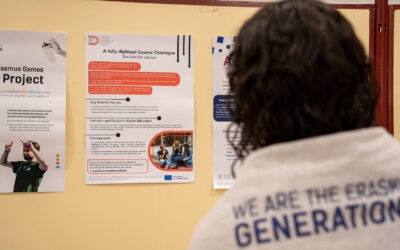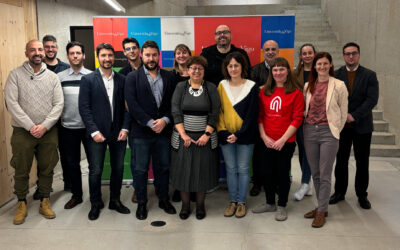Digitising Academic Catalogues for Enhanced Mobility
The project in a nutshell
DACEM aims to improve mobility by enhancing accessibility, completeness, timeliness, consistency and interoperability of Course Catalogues, supporting both Erasmus+ students and Higher Education Institutions (HEIs). The main goal of the initiative is to offer an open-source software and cloud platform for online Course Catalogues following the ECTS Users’ Guide.
Read more
DACEM aims to address longstanding challenges faced by Erasmus students, dating back to the programme’s inception in 1987. Since its launch, Erasmus has facilitated student and staff mobility, eventually evolving into Erasmus+ in 2014 to enhance higher education quality and foster transnational cooperation. Despite its evolution, Erasmus+ students continue to encounter difficulties accessing timely and accurate information about host institutions’ academic offerings. This lack of transparency affects crucial decisions regarding study courses and recognition of achievements abroad, contributing to lower-than-desired levels of recognition.
The DACEM project seeks to tackle these issues by developing a solution to maintain and provide up-to-date Course Catalogues (CCs) in an accessible, consistent, and interoperable manner. HEIs are mandated to digitise and regularly update their CCs to ensure transparency and accessibility. However, the digitisation process poses technical and cultural challenges, hindering progress towards sustainable and interoperable solutions. DACEM partners have identified persistent issues with CCs, prompting the project’s focus on developing an open-source solution, reference manuals, and a cloud platform. These outcomes aim to support HEIs and students in navigating mobility decisions and learning agreements effectively.
By creating a user-friendly platform that integrates with existing tools like Erasmus Without Paper (EWP), the NORM tool, and the Online Learning Agreement (OLA), DACEM strives to transform the experience for European Higher Education Institutions (HEIs) and students. The core activities of the project involve extensive mapping of current CCs, analysing user and stakeholder needs, and leveraging new technologies to develop an open-source CC solution and cloud platform. DACEM ensures transparency in course details, bridges accessibility gaps, and facilitates recognition across borders, levelling the playing field for all students, irrespective of their backgrounds or circumstances.
Pillars
Promoting Inter-connected Higher Education systems
DACEM enhances Course Catalogues for seamless data exchange and interconnection among HEIs, fostering collaboration and accessibility.
Supporting Digital Transformation
DACEM empowers HEIs with online Course Catalogues and contributes to the implementation of the European Student Card Initiative, making course information available at the fingertips of the students.
Advancing Inclusion and Equity in Higher Education
DACEM breaks barriers for underrepresented or marginalised groups facilitating access to and recognition of mobility.
Project timeline
February
2024
Kick off meeting
December
2024
Situation mapping
Technical requirements for online CC
November
2025
Cloud-based platform
Course Catalogue API
January
2026
Training resources for university staff
Guidelines for students
June
2026
Policy recommendations
July
2026
Open source software
Final conference
News
Building the Future of Course Catalogues
The paper presented at ERACON 2025 in Thessaloniki has now been published in the official ERACON Conference Proceedings and is freely available in open access.
DACEM digital course catalogue 1.0 ready for piloting
The first version of the DACEM digital course catalogue is here! This 1.0 release marks a key step in the project’s journey toward creating a centralised, student-friendly platform.
DACEM spotted all over Europe
DACEM has made appearances across Europe, bringing the idea of a digital course catalogue closer to students and higher education staff.
What Did the Course Catalogue Mapping Exercise Uncover About European Higher Education?
Discover key insights from the DACEM project’s mapping of course catalogues across European universities, highlighting challenges and opportunities to improve academic mobility and student access to course information.
Improving Course Catalogues for Better Student Mobility: Key Insights from the DACEM Report
The latest DACEM report reveals that many students and university staff face persistent difficulties when using these systems. Read more
Student Survey for a Better Course Catalogue Experience
The DACEM consortium just launched an online survey to gather feedback from incoming and outgoing Erasmus students who participated during the 2023/2024 academic term.
DACEM Project Presented at FIE 2024
The DACEM project was presented at the Frontiers in Education (FIE) 2024 conference in Washington D.C.
Summer Mapping Insights: DACEM Project’s Findings on Course Catalogues
A flash update from the DACEM project on the analysis of how European universities share course information, with focus group insights driving future improvements.
DACEM kicks off in Vigo
The DACEM project officially kicked off on February 7th and 8th in Vigo, Spain.
Outputs and Resources
Open-source course catalogue software and platform
The consortium will develop an open-source Course Catalogue solution designed for European Higher Education Institutions to showcase their learning offerings in line with the ECTS Users’ Guide. Additionally, a cloud-based platform will deploy the open-source CC solution, providing HEIs with an option to access the solution without installing it on their own premises.
More information coming soon
Training resources for university staff
The consortium will create user-friendly training resources for university staff to effectively use the CC cloud platform, including instructions on populating and updating the CC, along with tools to ensure the information is complete and consistent.
More information coming soon
Guidelines for students
The consortium will develop clear guidelines for students, providing explanations on how to use the CC cloud platform, focusing on the information and functionalities it offers to them.
More information coming soon
Policy recommendations and other documents
The consortium will develop policy recommendations demonstrating how the use of the online CC platform/software can enhance mobility implementation and impact the Erasmus+ mobility process. These recommendations will highlight the significance of digitised CCs and offer concrete suggestions for future improvements.
Focus Groups and Interviews Report
Course Catalogue Mapping
Existing Standards & Interoperability Specs for CCs
Technical Architecture for CCs
Partners
University of Vigo
Thessaly University
Charles University
University of Maribor
Erasmus Student Network AISBL (ESN)
University of Orleans
European University Foundation
Virtual Campus LDA
Tallinn University
Associate Partners
Hellenic Mediterranean University
Maria Curie-Skłodowska University
Polytechnic Institute of Porto
University of Salento
University of Siegen
Vilnius Gediminas Technical University
Supported by
ATHENA European University
Contact us
Manuel Caeiro – project coordinator
manuel.caeiro@det.uvigo.es








